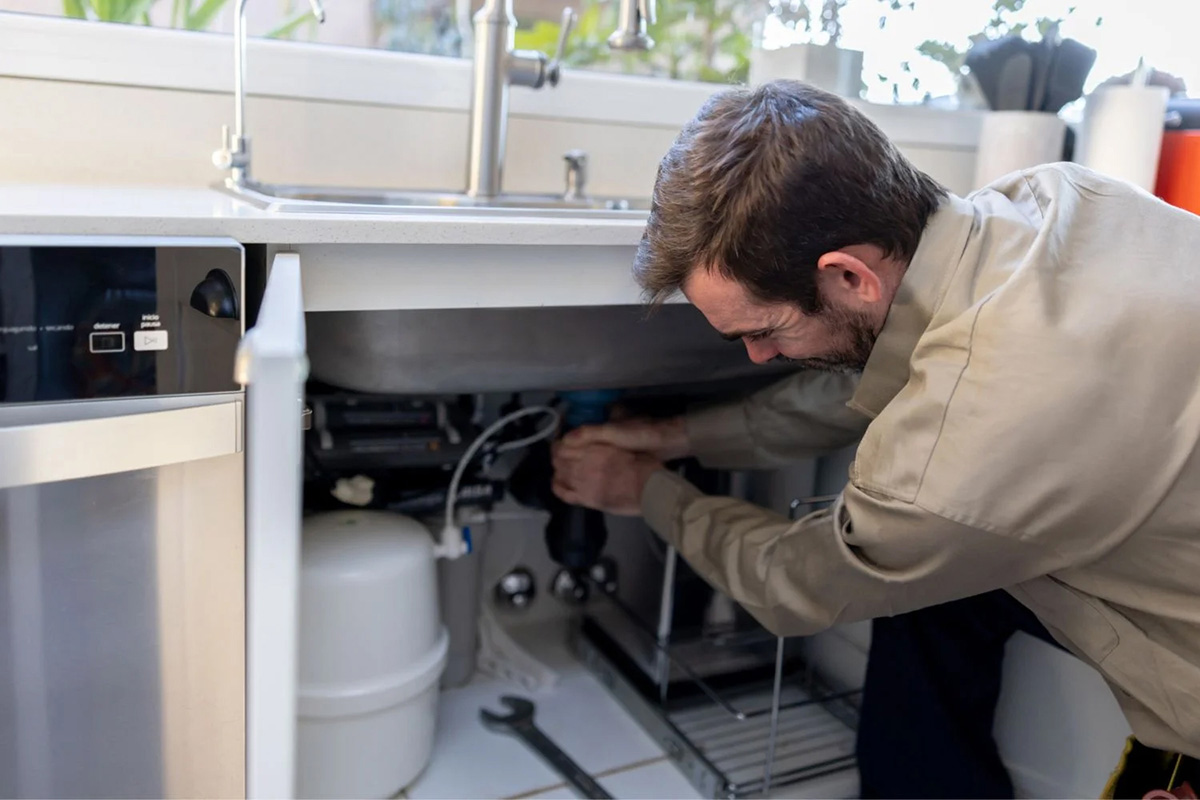

Finance
How Much Is Handyman Insurance?
Published: November 17, 2023
Find out how much handyman insurance costs and get the coverage you need to protect your finances. Compare quotes and secure your financial future today.
(Many of the links in this article redirect to a specific reviewed product. Your purchase of these products through affiliate links helps to generate commission for LiveWell, at no extra cost. Learn more)
Table of Contents
Introduction
Being a handyman can be a rewarding and profitable career choice. Whether you’re skilled in plumbing, electric work, carpentry, or general home repairs, helping people solve their household woes is a valuable service. However, like any profession, it’s essential to protect yourself and your business from potential risks.
Handyman insurance is a type of insurance that provides coverage for the unique risks that come with being a handyman. From accidental property damage to bodily injury, this insurance safeguards you from financial burdens that could arise from lawsuits, medical expenses, or repair costs.
In this article, we’ll dive into the world of handyman insurance, exploring the different types of coverage available, the factors that can affect the cost of insurance premiums, and how to choose the right policy for your needs. Additionally, we’ll provide some helpful tips to save money on handyman insurance without compromising your coverage.
Whether you’re a self-employed handyman or run a small handyman business, understanding the nuances of insurance is vital to protect what you’ve built. So, let’s get started and discover how much handyman insurance can cost and what factors impact these costs.
What is Handyman Insurance?
Handyman insurance is a specialized insurance policy designed to provide coverage for the unique risks that handymen face in their line of work. It offers protection against potential liabilities, accidents, or damages that may occur during handyman service activities.
This type of insurance typically includes general liability coverage, which protects you in case of property damage or bodily injury caused to a third party. For example, if you accidentally damage a client’s property, handyman insurance can cover the cost of repairs or replacements.
In addition to general liability coverage, handyman insurance may also include specific coverages such as professional liability (errors and omissions insurance), which can protect against claims of negligence or faulty workmanship. This is especially important if you provide advice or recommendations to clients as part of your handyman services.
Another component of handyman insurance is tools and equipment coverage. This coverage helps replace or repair your tools and equipment if they are damaged, lost, or stolen. Since handymen rely heavily on their tools to perform their work, this coverage can be invaluable in the event of an unexpected incident.
Moreover, if you have employees working for you, you may need to consider workers’ compensation insurance as part of your handyman insurance policy. This coverage protects your employees in case of work-related injuries or illnesses and provides medical expenses and lost wages.
Overall, handyman insurance is essential for protecting your business and personal assets. Without it, you could be held responsible for costly legal fees, medical expenses, or property repairs, which can significantly impact your financial stability.
Types of Handyman Insurance
When it comes to handyman insurance, there are several types of coverage options available to suit different needs and budgets. Let’s take a closer look at some of the common types of handyman insurance:
- General Liability Insurance: This is the most basic and essential type of handyman insurance. It provides coverage for property damage, bodily injury, and personal injury claims that may arise during your handyman services. General liability insurance protects you from potential lawsuits and can cover legal fees, medical expenses, and damages awarded to the injured party.
- Professional Liability Insurance: Also known as errors and omissions insurance, professional liability insurance protects you against claims of negligence, mistakes, or omissions in your work as a handyman. It provides coverage in case a client alleges that your advice or workmanship resulted in financial loss or damage.
- Tools and Equipment Insurance: As a handyman, your tools are essential to your work. Tools and equipment insurance provides coverage for the repair or replacement of your tools and equipment if they are damaged, lost, or stolen. This coverage ensures that you can continue your work even if an unexpected incident occurs.
- Commercial Auto Insurance: If you use a vehicle for business purposes, such as transporting your tools or traveling to clients’ homes, commercial auto insurance is crucial. It provides coverage for property damage and bodily injury caused by an accident involving your business vehicle.
- Workers’ Compensation Insurance: If you have employees working for your handyman business, workers’ compensation insurance is essential. It covers medical expenses, disability benefits, and lost wages for your employees in case of work-related injuries or illnesses.
It’s important to assess your specific needs as a handyman and consult with an insurance professional to determine the right combination of coverage for your business.
Factors Affecting Handyman Insurance Costs
The cost of handyman insurance can vary depending on several factors. Understanding these factors can help you navigate the insurance market and find the most affordable coverage that meets your needs. Here are some key factors that can affect the cost of handyman insurance:
- Type and level of coverage: The types of coverage you opt for and the level of coverage you choose will impact the cost of your insurance. For example, if you decide to add professional liability coverage to your policy, your premiums may be higher compared to a basic general liability policy.
- Business size and revenue: The size of your business and the revenue it generates can also influence the cost of insurance. If you have a larger business with more employees and higher revenue, you may need more coverage, resulting in higher premiums.
- Claims history: Insurance providers consider your claims history when determining your premiums. If you have a history of frequent claims or high-cost claims, insurance companies may view you as a higher risk and charge higher premiums.
- Location: Where your handyman business operates can impact insurance costs. Factors such as local regulations, crime rates, and the prevalence of certain risks in your area can affect your premiums.
- Experience and qualifications: Your experience and qualifications as a handyman can also influence insurance costs. Insurance providers may consider factors such as your years of experience, certifications, and licenses when determining your risk profile and premiums.
- Claims history: Insurance companies consider your claims history when determining the cost of insurance. If you have a history of frequent claims or high-cost claims, your premiums may be higher.
It’s important to note that each insurance provider may weigh these factors differently, so it’s recommended to compare quotes from multiple insurers to get the best coverage at the most competitive price. Additionally, implementing risk management practices, such as maintaining a safe work environment and adhering to proper procedures, can also help to lower your insurance costs over time.
Average Cost of Handyman Insurance
The cost of handyman insurance can vary depending on several factors, including the type and level of coverage, the size of your business, your claims history, and your location. While it’s difficult to provide an exact average cost, we can provide a general estimate based on industry research and data.
On average, handyman insurance can range from $500 to $1,500 per year for a basic general liability policy. This cost may increase if you add additional coverages such as professional liability or tools and equipment coverage. Keep in mind that these figures are approximate and can vary based on your specific circumstances.
Factors such as the size of your business, the number of employees you have, and the level of risk associated with your operations can also impact the cost of your insurance. Smaller businesses with fewer employees and lower revenue may have lower premiums compared to larger businesses with higher revenue and more employees.
Additionally, your claims history plays a significant role in determining the cost of handyman insurance. If you have a history of frequent or costly claims, insurance companies may view you as a higher risk and charge higher premiums. On the other hand, if you have a clean claims history, you may be eligible for lower premiums.
Your location can also impact the cost of insurance. Insurance premiums can vary based on the local regulations, crime rates, and the prevalence of certain risks in your area. For example, if you operate your handyman business in an area prone to natural disasters or higher crime rates, your insurance premiums may be higher.
It’s important to note that these figures are just estimates, and the actual cost of your handyman insurance will depend on various factors specific to your business. To get an accurate cost estimate, it’s advisable to obtain quotes from multiple insurance providers and compare the coverage and prices they offer.
While insurance premiums may seem like an additional expense, they provide essential protection for your business and help safeguard your financial security in the event of unforeseen accidents, damages, or lawsuits.
Choosing the Right Handyman Insurance Policy
Choosing the right handyman insurance policy is crucial to adequately protect yourself and your business from potential risks. Here are some key considerations to help you select the right insurance policy:
- Evaluate your specific needs: Assess the nature of your work and the risks involved. Consider the types of services you offer, the tools and equipment you use, and the potential liabilities you may face. This will help you determine the necessary coverage types and limits for your handyman insurance policy.
- Research insurance providers: Take the time to research and compare insurance providers. Look for reputable companies that specialize in providing insurance for handymen or small businesses. Read reviews, consider their financial stability, and evaluate their customer service reputation.
- Consider coverage options: Review the coverage options offered by different insurance providers. Look for policies that include general liability, professional liability, tools and equipment coverage, and workers’ compensation if applicable. Ensure that the policy covers the unique risks associated with your handyman business.
- Review policy limits and deductibles: Examine the coverage limits and deductibles offered by insurance policies. Ensure that the limits are sufficient to cover potential claims and that the deductibles are affordable for your budget.
- Understand policy exclusions: Pay attention to policy exclusions or limitations that may impact your coverage. Be aware of any circumstances, services, or activities that may not be covered under the policy.
- Seek professional advice: Consulting an insurance professional can provide valuable insights and guidance. An experienced insurance broker or agent can help you navigate the complexities of insurance, explain the fine print, and assist you in selecting the best policy for your specific needs.
- Review pricing and discounts: Compare the pricing of different insurance policies and consider any available discounts. Some insurers may offer discounts for bundling multiple policies, having a clean claims history, or implementing risk management practices.
- Read and understand the policy documents: Thoroughly read and understand the terms and conditions of the insurance policy before making a final decision. Ask questions about anything that is unclear or confusing to ensure you have a complete understanding of your coverage.
Remember, the goal is to find a handyman insurance policy that provides adequate coverage at a reasonable cost. By considering these factors and conducting thorough research, you can make an informed decision and choose the right policy to protect you and your business.
Tips for Saving Money on Handyman Insurance
Handyman insurance is essential for protecting your business, but it’s also important to manage your insurance costs effectively. Here are some tips to help you save money on your handyman insurance premiums:
- Shop around and compare quotes: Obtain quotes from multiple insurance providers to compare coverage options and prices. This allows you to find the best deal that meets your specific needs.
- Bundle your policies: Consider bundling your handyman insurance with other business insurance policies, such as commercial auto insurance or property insurance. Insurance companies often offer discounts for combining multiple policies.
- Implement risk management practices: Maintaining a safe work environment and following proper procedures reduces the likelihood of accidents or claims. Insurance companies may offer lower premiums to businesses that demonstrate a commitment to risk management.
- Invest in safety measures: Installing safety equipment such as fire alarms, security systems, and safety barriers can minimize risks and potentially lead to lower insurance premiums.
- Manage your claims history: Minimize the number and cost of insurance claims by implementing best practices and proper training for your employees. A clean claims history can result in lower premiums over time.
- Review your coverage needs: Regularly assess your coverage needs to ensure you are not overinsured or underinsured. Adjust your coverage limits and types based on the specific risks your handyman business faces.
- Increase deductibles: Opting for higher deductibles can lower your insurance premiums. However, ensure that the deductible amount is still manageable in case you need to make a claim.
- Seek professional advice: Consult with an insurance professional who specializes in small business or handyman insurance. They can provide valuable insights and help you find cost-effective coverage options.
- Maintain good credit: Insurance companies may consider your credit history when determining premiums. Maintaining a good credit score can potentially help lower your insurance costs.
- Regularly review and update your policy: Over time, your business needs may change. Regularly review your insurance policy to ensure that it aligns with your current operations and coverage requirements.
By implementing these tips, you can potentially reduce your handyman insurance costs while still maintaining adequate coverage for your business.
Conclusion
Handyman insurance is a crucial investment for protecting your business and financial stability. It provides coverage for potential risks, including property damage, bodily injury claims, and liability lawsuits. By understanding the different types of handyman insurance, the factors that affect insurance costs, and how to choose the right policy, you can make informed decisions to safeguard your business.
When considering handyman insurance, it’s important to evaluate your specific needs, research insurance providers, and compare quotes to find the most suitable and affordable coverage. While insurance premiums may seem like an additional expense, they provide essential protection and peace of mind for the unforeseen circumstances that can arise in your line of work.
Additionally, there are strategies to reduce your handyman insurance costs, such as bundling policies, implementing risk management practices, and maintaining a clean claims history. Regularly reviewing and updating your coverage needs can also ensure you have the appropriate level of protection for your business operations.
Remember to consult with insurance professionals who specialize in handyman insurance for expert advice and guidance. They can help you navigate the complexities of insurance policies, explain coverage options, and assist in finding the best coverage at the most competitive price.
By prioritizing handyman insurance and implementing cost-saving strategies, you can protect yourself, your business, and your clients from potential financial losses, allowing you to focus on delivering quality handyman services and growing your business with confidence.














